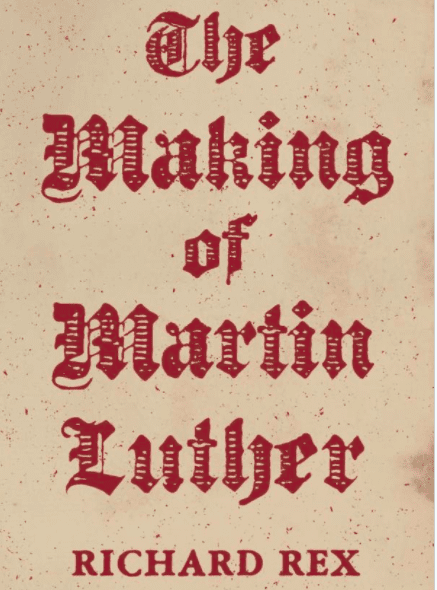 His claim is that Luther’s doctrine of justification by faith is a species of indulgences and is, in fact, the most extreme form of indulgence. Everything for nothing. Salvation for doing nothing. So Richard Rex in his new book, The Making of Martin Luther.
His claim is that Luther’s doctrine of justification by faith is a species of indulgences and is, in fact, the most extreme form of indulgence. Everything for nothing. Salvation for doing nothing. So Richard Rex in his new book, The Making of Martin Luther.
I’m no fan of faux-Alte Schrift design for letters on Reformation books, but I suppose one gets an ancient feel from the Alte Schrift. In part it is because I learned to read Alte Schrift and considered it a mark of distinction to read old German books. Anyways, as a friend of mine used to say, who cares?! Or as another says, It is what it is.
On to Luther and indulgences and Rex’s (seemingly) preposterous claim.
Here’s how Rex works out his theory of Luther’s indulgences-on-steroids:
Yet the most interesting feature of his [Luther’s] original critique of indulgences is the vast gap it reveals between his theological standpoint in autumn 1517 and his new position in spring 1518. For, within a year, he was offering Christians salvation on the cheapest terms ever.
When Luther first began he had not yet worked out his theory of justification by faith alone — grace alone. So, Rex has made here an important point. His original theory against indulgences had more to do with the minimalistic approach: all they had to do was get the indulgence, largely through donations, and not attend to repentance and obedience.
Rex, however, and he admits this is not a cheap shot, and his book proves he’s not taking cheap shots. But his point is nonetheless a zinger and stinger. Rex contends there is a direct correlation between indulgences and justification by faith.
From one point of view, the doctrine of justification by faith alone was simply the proclamation of a universal, plenary indulgence, available at absolutely no cost or effort. This is no mere cheap shot. For a start, Luther himself was perfectly clear about the parallel. He himself announced that the only indulgence of any value to Christians was the one issued by God.
In his day Luther was criticized for just this point. He required nothing but faith.
The critique of moral hazard which he had been willing to deploy against the traditional doctrine of indulgences was therefore, inevitably, deployed still more readily against his new doctrine by his opponents. Luther’s superindulgence required absolutely nothing of its beneficiaries, not even a token donation or a perfunctory prayer, let alone the inconvenience and embarrassment of confession to an all too human priest (though Luther left plenty of room for such confession, which he continued to regard as a salutary moral discipline, if conducted in the right way). The very slogan “faith without works” said it all.
I have not read the whole book but it seems to me as I read this that this might be the precise point of Luther: no one got an indulgence for doing nothing but believing. Justification was had for nothing but faith in Christ alone. It is not, then, anything like an indulgence. (Perhaps I misunderstand.)
Luther’s problem was the impact of his theology on the morality of those in his churches. Were they changed? Were they transformed?
Luther sought to mitigate the risk by insisting that those people who were genuinely justified by faith necessarily and almost naturally brought forth the fruit of good works in their lovingly Christian lives. But the moral hazard was undeniable, and is evidenced in the extent to which Protestant Reformers throughout the sixteenth century felt the need to counter the intellectual challenge posed by what they described as “antinomianism” or “libertinism.”
So Rex poses the irony of Luther creating justification by faith, superindulgence theory, as a contrast to indulgences, but his theory ended up being a kind of indulgence.
It is not merely that there is an ironic coincidence between Luther’s doctrine of justification and the scholastic doctrine of the indulgence. It is not even that there is an adventitious historical connection between the doctrine of the indulgence and the origins of his new doctrine. [Shown above.]
Rex contends that Luther’s justification by faith was formed because indulgences were a viable theological category in the air.
It is on reflection plain that Luther s doctrine of justification could not have been conceived, could not have been imagined, could not have been developed if the scholastic doctrine of the indulgence had not previously been worked out by the theologians of the Middle Ages. By a much deeper irony, Luther’s understanding of justification is conditioned by the scholastic theory of indulgences.
Even more.
It might almost be regarded as the logical consequence of that theory, and can certainly be seen as its most extreme formulation. The conception of the infinite superabundance of Christ’s merits which underpinned the theory of indulgences was fundamental to the rhetoric of the “passion and merits” of Christ that ran through sixteenth-century Protestant preaching and devotion.
Rex pushes harder in his rhetoric.
Luther’s doctrine of justification was not so much a reaction against the theory of indulgences as its culmination. This may be why Luther did not formulate his own theology of justification until, thanks to the furore over indulgences, he had not only started, unknown to himself, to cut his ties with the authority of the Church, but had somehow loosed his imagination from the constraints of medieval understandings of how Christian salvation worked.
Here is Rex’s strongest stinger.
He had at first thought that the doctrine of indulgences went too far. What he realized later was that it did not go far enough.
I contend that in going farther than indulgences, Luther abandoned indulgence theology to create a different kind of theology: one rooted in faith alone, grace alone, in Christ alone.
The issue, of course, is if Paul too offered this so-called ironic superindulgence.
Is this theory of Rex preposterous or not?















